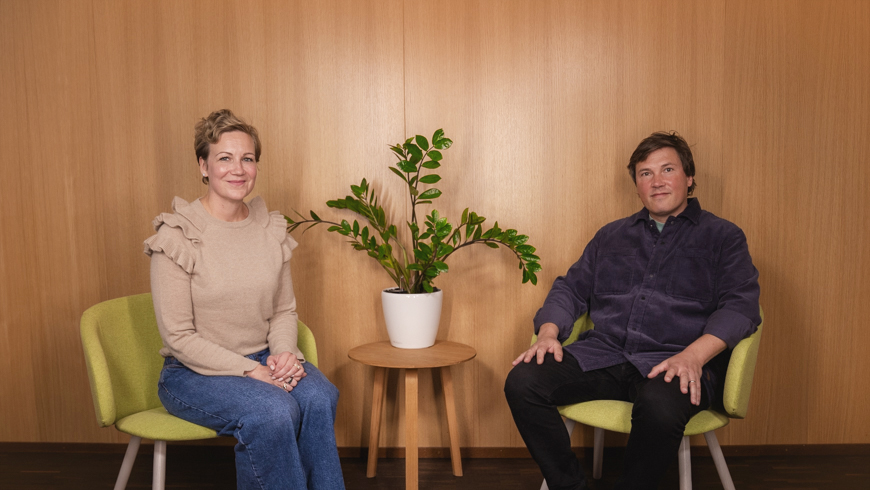
In the podcast Mehiläisen pisto, we discuss the topics of exhaustion and difficulties with coping, as occupational health psychologist Mikko Luukkainen is visited by Minttu Viitanen from Accenture. Exhaustion as a phenomenon is on the rise as portrayed by mental health statistics, number of sick leaves, and work ability of individuals and organisations. According to research, 65 percent of the Finnish workforce view exhaustion as a clear danger, or, at the very least, think about exhaustion occasionally. Exhaustion is a complex phenomenon that unfolds when the load has been too much for too long, and the recovery has not been sufficient enough.
Watch the video
Minttu Viitanen works as the manager of public services and healthcare at Accenture. Accenture is a business helping their customers with different digitalisation projects. Viitanen explains that consultants work in environments where they are met with expectations from customers as well as from their own organisation.
‘The customer’s perspective is always prioritised during scheduling, but there are internal expectations, too. Often, we must look for a compromise. However, stressful aspects can originate from within an organization, while working with a client turns into energy – and vice versa’, Viitanen discusses.
Viitanen states that at Accenture, people can influence the amount of work and working methods even to a large extent, depending on the situation. People can combine and adapt, for example, a part-time job with consultation work. Similarly, people can influence the location and load of work: how much overall responsibility the employee wants to take? If the employee is extremely ambitious and they have the energy to push forward, they themselves can decide how much work they wish to have. Working overtime is not, however, considered as the norm at Accenture. People should manage the amount of work during the normal working hours. During the first stages of their career, Viitanen recalls being an enthusiastic and proactive employee that valued the client’s trust.
‘I invested so much time on work. I worked in an international environment, and I travelled a lot. Work became a large part of my life, but it was more than just work. I made life-long friends during those times’, Viitanen recalls.
Exhaustion Is a Sum of Many Factors
Viitanen’s career has included pressures and stress, too. The first years as a consultant might have been the most difficult mentally. Viitanen thinks that many experience the same emotions during their first workplaces until they learn the way of doing and working environment. One turning point in people’s career is starting a family. When Viitanen’s daughter was small, they felt like their previous “gig life” became heavier.
‘The bigger picture changed, and daily life operations required more time. Furthermore, I didn’t have the same possibility for recovering, because I had to compensate for the things I missed while I was away. This way, it’s easy to start burning the candle from both ends’, Virtanen recalls.
Viitanen’s assets were heavily tested in 2015. Back then, they were involved in a fascinating work project together with an international team. Work consisted of long workdays, and travel days accumulated. This stressful situation continued for more than half a year. Viitanen also got pregnant during that time but suffered a miscarriage.
‘This combination was too much. I noticed that I was in a situation where I couldn’t work. Looking back at the situation now, an individual thing did not cause this all. I could’ve dealt with the workload if I wasn’t experiencing personal losses at the same time’, Viitanen ponders.
Even our environment doesn’t always understand that things related to natural life take so much from us. The significance of different losses and illnesses influences our capabilities nearly unseen. Nobody wakes up in the middle of the night to realise that ‘I’m tired now’. Our state weakens gradually, which makes getting used to it dangerously easy.
‘First, my sleep got disturbed, and my thought process narrowed. Many might have noticed my situation, but people didn’t intervene until it was all too late. I know that many people are incapable of work for a very long time, but I could return to working life after a month’s rest’, Viitanen explains.
Simple things helped with recovery: when you are tired, you must rest. Viitanen had developed an unsustainable working method during the starting stages of their career. In 2015, Viitanen realised that it was time to rethink their working methods. The change didn’t happen over a week: comprehension is always reached over time. Viitanen understood that they didn’t have to solve everything. A new kind of stressful situation emerged when Viitanen was diagnosed with cancer in June last year.
‘I had to leave everything behind and jump straight into cancer treatment within a week. Currently, the cancer is in remission, and I have returned to work. However, I realised, once again, that things go on without me’, Viitanen states.
Meaningful Work: A Double-Edged Sword
Viitanen thinks that they were, more or less, limitless with regards to work: work-related things followed them everywhere. Viitanen is still flexible, but now, they hold on to their limits.
‘People who set limits are often more empathic, too. If people don’t feel like they are respected, they don’t have the same amount of power to empathise with others’, Viitanen explains.
Viitanen has two children, and currently, their family takes the priority. Viitanen receives help from outside sources on daily life operations a couple times a week, giving them the opportunity to work more. Balance has been found.
Meaningful work has a direct connection to coping, too. Still, Viitanen views this as a double-edged sword: the experience of being meaningful can be an asset, but it can also become a prison.
‘I wouldn’t mention passion and work in the same sentence because people get easily lost in passion. It doesn’t sound all that sustainable to me. Then again, if people have meaningful jobs, investing a lot of time on it is easier to validate’, Viitanen summarises.